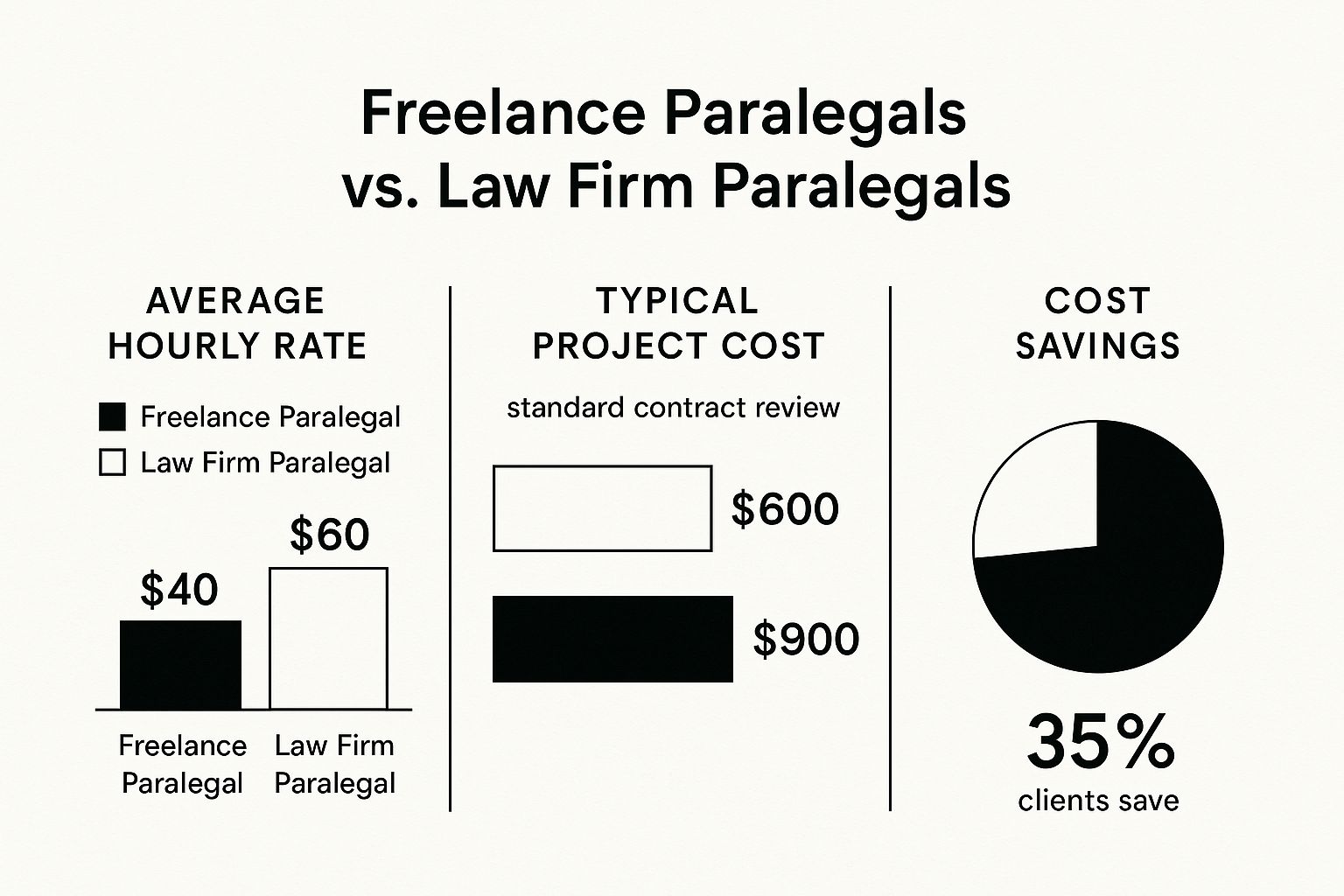Think of a freelance paralegal as your firm's secret weapon. It’s about getting specialized legal help, right when you need it, without the strings (and costs) of a full-time hire. This isn't just about plugging a temporary gap; it’s a smart, strategic way to manage your resources.
The New Reality of Legal Support
Let's be honest, the legal world is a pressure cooker. Caseloads explode overnight, deadlines are absolute, and every dollar in the budget has a job to do. The old model of hiring—with all its overhead like benefits, office space, and endless training—is just too stiff for today's fast-paced environment.
This is exactly why freelance paralegals have gone from a niche fix to a core strategy for so many firms, big and small. It's how you build a legal practice that's nimble and tough enough to handle anything.
Your Strategic Legal Bench
Picture this: you have a go-to list of experienced paralegals, each a specialist in something different—e-discovery, contract management, IP, you name it. Instead of paying a full-timer's salary for skills you only need a few times a year, you can bring in that specific expert for that specific project.
It's a simple but powerful shift. You're turning fixed labor costs into flexible expenses that directly track with the work that's actually making you money. You’re moving from a bulky, expensive workforce to a lean, efficient one.
This frees up your core team to focus on what they do best: high-level strategy and keeping clients happy. Meanwhile, your freelance pro is crushing the intensive, project-based work. The result? A more focused, more productive, and much healthier bottom line.
The Gig Economy and the Law Firm
This whole flexible approach has been supercharged by the rise of the gig economy and the tech that powers it. Secure cloud platforms, encrypted chat tools, and slick project management systems mean a remote paralegal can plug into your workflow securely and without missing a beat.
And this isn't just a legal-world trend; it's a global movement. By 2025, the worldwide freelance economy is expected to have 1.57 billion professionals, making up almost 47% of the entire global workforce. The demand for this model is especially hot in major legal hubs. We've seen the U.S. freelance market jump by 78% and the U.K. market by 59% in recent years, which tells you everything you need to know about the growing appetite for outsourced legal help. You can dig deeper into these freelancing trends and their impact across different industries.
It’s a win-win-win situation:
- For Law Firms: You get incredible flexibility to handle unpredictable workflows and keep a tight grip on costs.
- For In-House Legal Teams: You can tap into specialized skills for complex projects without adding to your permanent headcount.
- For Paralegals: They get more freedom, a variety of interesting work, and the chance to build a career on their own terms.
At the end of the day, using freelance paralegals is about building a modern legal support system that's ready for anything. It’s a strategic choice that helps your firm deliver amazing work for clients while staying financially and operationally agile.
The True Scope of Freelance Paralegal Work

When you hear "paralegal," it’s easy to picture someone buried in administrative tasks. But that's not the whole story, especially when it comes to freelance paralegal services. These pros are far more than just extra hands for filing—they’re high-value specialists who manage the kind of complex, mission-critical work that keeps a legal practice humming.
Think of it less like outsourcing a to-do list and more like bringing in an expert to tackle a specific, demanding project. This frees up your core team to focus on the big picture and client relationships, knowing the essential details are being handled by a pro.
This is especially true when your firm gets hit with a sudden wave of work. Picture a massive case where discovery unearths a mountain of documents you weren't expecting. A freelance litigation support specialist can parachute in to manage that flood, preventing your team from getting completely swamped.
What Do They Actually Do?
So what does this work look like on a day-to-day basis? While the specifics always depend on the case, most freelance paralegal work slots into a few key operational areas. Each one requires a unique skillset and solves a different headache for law firms and corporate legal teams.
To give you a clearer picture, here’s a breakdown of some of the most common service offerings.
Core Freelance Paralegal Service Offerings
| Practice Area | Common Tasks and Responsibilities | Typical Use Case |
|---|---|---|
| Litigation Support | E-discovery management, document review, deposition summaries, trial prep, exhibit organization | A firm facing an unexpected deluge of discovery documents for a major lawsuit. |
| Corporate & Transactional | Due diligence for M&A, entity formation/dissolution, contract management, compliance tracking | A company preparing for an acquisition needs to review hundreds of contracts and corporate records on a tight deadline. |
| Intellectual Property (IP) | Trademark/patent application filings, docketing deadlines, prior art searches, infringement monitoring | A tech startup needs to file multiple patents but doesn't have a full-time IP paralegal on staff. |
| Real Estate Law | Preparing closing documents, title commitment reviews, lease abstraction, zoning research | A commercial real estate firm needs support to manage a high volume of closings at the end of the quarter. |
| Family Law | Drafting pleadings, financial disclosure management, preparing for mediation, managing discovery requests | A small family law practice needs help preparing multiple cases for upcoming mediation hearings. |
This is just a starting point, of course. The real value comes from their specialized knowledge in areas that demand meticulous attention to detail.
For instance, one of the biggest jobs is litigation support. This is the engine room of any case, where a single missed detail can have huge consequences.
- E-Discovery Management: They dive into massive volumes of electronic data—emails, texts, digital files—to find the crucial evidence, all while keeping a perfect chain of custody.
- Document Review and Coding: This is the painstaking work of analyzing every document for relevance, privilege, and key information. It’s the foundation of a strong case.
- Deposition and Trial Prep: Freelancers are often the ones pulling together deposition summaries, organizing exhibit binders, and coordinating logistics so attorneys can walk into court fully prepared.
When you're dealing with critical legal documents, even knowing the nuances of something like the legal binding nature of faxed documents can be a game-changer. A seasoned freelancer just gets it.
Another huge area is corporate transactions. These tasks are the backbone of mergers, new business ventures, and ongoing compliance.
A freelance corporate paralegal acts as a steady hand guiding complex processes. For a startup, this might mean managing entity formation paperwork. For a large corporation, it could involve coordinating due diligence for a multimillion-dollar acquisition.
Finally, many freelancers build their entire careers in niche practice areas, bringing a level of expertise that’s either hard to find or too expensive to keep on the payroll full-time.
- Intellectual Property (IP): Managing trademark and patent filings, keeping track of deadlines, and running preliminary searches.
- Real Estate: Drafting closing documents, reviewing title commitments, and managing complex lease agreements.
- Family Law: Drafting pleadings, organizing financial disclosures, and preparing all the necessary documents for mediation.
Let’s Put It All Together
Imagine a small firm takes on a complex intellectual property dispute. Their in-house team is already stretched thin. Instead of passing on the case or making a costly full-time hire, they bring in a freelance paralegal who lives and breathes patent litigation.
Right away, this expert takes over. They start organizing prior art, managing the constant back-and-forth with the patent office, and building detailed case chronologies. This frees up the firm’s attorneys to do what they do best: craft legal arguments and focus on client strategy.
The result? Better service for the client, predictable costs, and a team that isn’t on the verge of burnout. That’s the real-world power of bringing in a freelance paralegal.
Gaining Your Competitive Edge with Freelance Talent

Bringing on a freelance paralegal isn't just about filling a seat—it's a sharp, calculated business move. It’s about building a leaner, more responsive legal operation that can genuinely outmaneuver the competition.
The upsides go way beyond just saving a few bucks. We're talking about smarter financial decisions, incredible operational flexibility, and on-demand access to specialized skills you might not have in-house. It’s a complete shift away from rigid employment structures and toward a dynamic support system built exactly for what you need, when you need it.
Financial Intelligence and the True Cost of Hiring
The most obvious win is financial, but it's much deeper than just the salary line item. When you bring on a full-time employee, you're on the hook for a lot more than their 40 hours a week. There's a whole ecosystem of hidden costs that pile up fast.
Think about the "true cost" of a traditional hire. Beyond their base pay, you have to factor in:
- Benefits: Health insurance, retirement plans, and paid time off can easily tack on an extra 25-40% to the salary.
- Overhead: This is the pricey stuff—office space, a computer, software licenses, and even utilities.
- Taxes and Insurance: Don't forget payroll taxes, workers' comp, and unemployment insurance. They’re significant, ongoing expenses.
- Training and Development: Getting someone new up to speed and keeping their skills sharp is a constant investment of both time and money.
With a freelance paralegal, you sidestep almost all of that. You pay a clear, agreed-upon rate for the work, period. A huge fixed cost instantly becomes a predictable variable expense. That's financial agility in action.
Unlocking Operational Agility
Legal work is famously unpredictable. One minute it's quiet, the next a massive, document-heavy case lands on your desk, demanding all hands on deck. With a traditional team, these surges create a crisis. You’re either understaffed, risking burnout and mistakes, or you’re overstaffed during the lulls, paying for people to sit around.
Freelance paralegals completely solve this problem. Think of them as an elastic support system that can stretch or shrink to perfectly match your current caseload.
This model lets you scale your team instantly. Need an e-discovery pro for a six-week project? Done. Does a big real estate closing need an extra pair of hands for just ten days? A specialist is ready to jump in. This smooths out the operational bumps and keeps your core team focused on their most important, high-value work.
And it’s not just for law firms. Corporate legal departments can bring in freelance paralegals to handle the overflow during crazy periods like quarter-end reporting or major compliance audits.
Accessing a World of Specialized Expertise
Here’s the real game-changer: gaining access to a massive pool of specialized talent. Many of the best freelance paralegals have spent their entire careers mastering a specific niche, whether it's intellectual property, complex litigation, or M&A due diligence.
Trying to hire that level of expertise full-time can be wildly expensive, especially for a smaller firm or for skills you only need once in a blue moon. The freelance model tears down that barrier.
A boutique firm can suddenly go toe-to-toe with larger rivals by bringing in a top-tier IP paralegal for one specific patent case. A corporation can get expert help navigating tricky international compliance without adding a permanent specialist to the payroll. You get the full benefit of their years of focused experience, delivering a huge return on your project.
These pros are also highly motivated and business-savvy. For them, knowing how to get freelance clients is a core skill, which means they’re driven to deliver incredible results to protect their reputation. Ultimately, freelance paralegal services are a strategic tool that lets you boost your firm's capabilities, control costs, and react to market demands with speed and precision.
Freelancers vs. ALSPs: Which Model is Right for You?
When your firm needs an extra set of hands, you’re no longer stuck with the old-school hiring process. The legal world has opened up, but you have to know who the players are. Your two main options are hiring an individual freelance paralegal or working with a big Alternative Legal Service Provider (ALSP).
While they both offer a break from traditional employment, they are worlds apart in how they operate. Honestly, choosing the right one comes down to what you need, the scale of your project, and the kind of relationship you want to have.
Here’s a simple way to think about it.
An ALSP is like a massive, industrial-scale catering company. They have the team, the gear, and the standardized processes to handle a 5,000-person gala without breaking a sweat. It's an impressive operation built for sheer volume.
Hiring a freelancer, on the other hand, is like bringing in a private chef. You get a direct line to a specialist who gets to know your tastes and tailors everything to your specific needs. They become part of your team for that one project, offering a personal touch and a truly collaborative experience.
So, What's the Deal with ALSPs?
ALSPs are large, often global, companies that offer a whole menu of bundled legal support services. They usually run on their own proprietary tech and have massive teams ready to tackle high-volume, repetitive tasks.
These guys are the heavyweights. And their growth shows just how much the legal industry is changing. The ALSP market, which includes freelancers, hit an estimated $28.5 billion in 2023 and is growing at a blistering 18% compound annual rate. That's not just a trend; it's a fundamental shift in how legal work gets done. If you want to go deeper, you can read the full 2025 ALSP report from Thomson Reuters to see the data for yourself.
You’d call an ALSP for things like:
- Massive E-Discovery: When you're staring down terabytes of data and need an army of reviewers, fast.
- High-Volume Contract Management: For churning through thousands of standard corporate contracts.
- Ongoing Compliance Monitoring: When you need a tech-driven solution to keep an eye on regulations 24/7.
The Freelance Paralegal Advantage
A freelance paralegal brings something completely different to the table. Instead of a formal vendor relationship, you get a direct partner. This model is all about clear communication, flexibility, and someone who can really dig into your specific workflow.
The real magic is in the personal touch and direct access. With a freelancer, the person you interview is the person who does the work. That means consistency and a genuine, deep understanding of your case.
This is the perfect fit for work that needs more than just brute force—it needs smart thinking and close teamwork. As you start to think about making your team more flexible, it's smart to know all the ways you can find talent. For a broader look, check out our guide on finding creative staffing solutions.
A freelance paralegal is your best bet when you need:
- Nuanced Case Support: For complex litigation where the paralegal needs to be in sync with the lead attorney on strategy.
- Specialized Expertise: When a case hinges on deep knowledge of a niche area, like a specific type of IP or real estate law.
- Direct Collaboration: For projects where you need constant back-and-forth and quick pivots to get things right.
Decoding Freelance Paralegal Pricing
Let's talk money. Figuring out how to pay a freelance paralegal is one of the biggest questions attorneys and firms have, but it's much simpler than you might think. Unlike the rigid salary of a full-time hire, freelance pricing is all about flexibility and matching the cost to the actual work you need done.
You’ll generally run into three main ways to pay: hourly rates, flat project fees, and monthly retainers. Each one has its own vibe and works best for different situations. The right choice really just boils down to the scope, length, and predictability of your legal project.
It can be helpful to see how other professional fields handle this. For instance, looking at how professional services are priced in areas like private investigation shows that value-based billing is a common thread. It’s all about paying for expertise, not just punching a clock.
The Hourly Rate Model
The most straightforward option is paying by the hour. It’s exactly what it sounds like—you pay for the time the paralegal spends on your case. This is your go-to model when you need maximum flexibility.
Think of it this way: you're in the middle of a messy litigation case, and the discovery requests just keep piling up. An hourly model is perfect here because you only pay for the time it takes, whether that's 10 hours one week or 40 the next. The only thing to watch for is "scope creep," where the project grows beyond your budget without you realizing it.
The Project-Based Flat Fee
Got a task with a clear beginning and end? A flat fee is your best friend. You and the paralegal agree on a single, all-in price for the entire job before a single document is touched. It offers total cost predictability.
This works great for well-defined, repeatable tasks. We see it all the time for things like:
- Business Formations: Handling all the paperwork to get an LLC or corporation off the ground.
- Standard Contract Reviews: Looking over a specific number of templated agreements.
- Trademark Applications: Filing a single, straightforward application from start to finish.
The big win here is that you know exactly what you're paying. No surprises. The flip side is that if you ask for work that wasn't in the original agreement, you'll need to work out a new fee for that extra stuff.
The infographic below really drives home the savings you can get by going freelance instead of hiring in-house.

As you can see, it's not just about a lower hourly rate. The savings on a per-project basis can be massive.
The Retainer Agreement
For those who need consistent, ongoing help, a retainer is the way to go. You pay a set amount each month, which guarantees you a certain number of the paralegal’s hours. It’s like having an expert on call.
This model builds a fantastic long-term relationship. Your freelance paralegal gets to know your firm, your clients, and your way of doing things inside and out. It’s ideal for handling a steady flow of smaller tasks like managing dockets or performing routine compliance checks.
Struggling to figure out a fair price for any of these models? You can always use a freelance rate calculator to get a solid starting point.
No matter which structure you choose, a few things will always influence the price. A paralegal with 20 years of deep experience in a niche area like patent law is going to command a higher rate than a generalist fresh out of school. And, of course, rush jobs will cost a little extra. Once you get these basics down, you’ll be able to pick the right pricing model with confidence.
Comparison of Freelance Paralegal Pricing Models
To make it even clearer, let's break down how these three common models stack up against each other. Understanding the pros, cons, and best-fit scenarios for different freelance paralegal payment structures is key to making a smart hiring decision.
| Pricing Model | How It Works | Best For | Potential Drawback |
|---|---|---|---|
| Hourly Rate | You pay the paralegal for each hour worked on your project. | Projects with unclear or evolving scopes, like complex litigation support. | Can be hard to budget for if the project scope expands significantly. |
| Flat Fee | A single, fixed price is agreed upon for a well-defined project. | Tasks with a clear start and end, such as an entity formation or a single contract review. | Any work outside the original scope ("scope creep") will require additional fees. |
| Retainer | You pay a fixed monthly fee to reserve a set number of hours. | Firms needing consistent, ongoing support for a steady stream of smaller tasks. | You pay for the hours whether you use them all or not in a given month. |
Ultimately, there's no single "best" model—only the best model for your specific need. By matching the project to the payment structure, you set up a win-win for both you and your freelance paralegal.
A Playbook for Hiring and Managing Remote Legal Talent

Bringing a freelance paralegal into your practice isn’t just about filling a seat. It's a strategic move, and to get it right, you need a game plan. Let's walk through how you find, vet, and manage top-tier remote talent to make sure every project is a home run.
First things first: where do you even look? You could toss a wide net on general freelance sites, but you’ll get much better results from platforms that specialize in the legal world. Think professional networks like LinkedIn or even your local bar association groups. These are great spots to find seasoned paralegals who already have a stamp of approval from their peers. And if you’re looking to cast a wider net, you can explore remote legal job opportunities on dedicated job boards.
Okay, you've got a list of names. Now comes the crucial part—separating the good from the great.
Evaluating Potential Candidates
A solid portfolio is a must, but what really matters is what's inside. You're looking for work samples that line up with the exact tasks you need done. Pay close attention to the small stuff: their organization, their clarity, their eye for detail. A well-redacted deposition summary or contract review can tell you more about their skills than a resume ever could.
The interview is your chance to go beyond the technical stuff. Sure, they need to know their way around legal documents. But a truly great freelance paralegal is also a rock-solid communicator, incredibly reliable, and always thinking one step ahead.
Try asking questions that get to the heart of how they work:
- How do you juggle tight deadlines when you have multiple clients?
- Tell me about a time you spotted a critical error in a legal doc. What did you do?
- What are your go-to tools for managing projects and communicating with a team?
Remember, you’re not just hiring help; you’re bringing on a business partner for a specific project. A paralegal who gets the hustle of running their own business will be far more invested in your success. Our article on building a thriving freelance business gives some great insight into this mindset.
Setting Up for Remote Success
You've found your person. Now what? The key to making a remote partnership work is crystal-clear communication from day one. Seriously, don't leave anything up to guesswork.
Set up a simple framework for how you’ll work together:
- Define the Mission: Create a detailed brief outlining every task, deadline, and what a "win" looks like for the project.
- Lock Down Communications: Use encrypted email and secure messaging tools for anything case-related. Client confidentiality is non-negotiable.
- Get on the Same Page: Use a project management tool like Asana, Trello, or Clio. It keeps everything—progress, files, and conversations—in one secure place.
Finally, set up regular check-ins. A quick daily huddle or a weekly sync-up call can stop small misunderstandings from turning into big problems. By setting clear expectations and using the right tools, you build a foundation of trust. This isn't just about hiring someone; it's about adding a powerful strategic asset to your team.
A Few Lingering Questions About Freelance Paralegals
Even after seeing how much value they can bring, you might have a couple of questions rattling around. Totally normal. Let's tackle the big ones so you can move forward with confidence.
Are Freelance Paralegals Bound by Confidentiality?
Yes, 100%. This is a non-negotiable in the legal world, and professional freelancers live by that code. They are held to the exact same strict ethical standards as any paralegal on your payroll. They get it—attorney-client privilege is sacred.
Any reputable freelance paralegal will insist on signing a Non-Disclosure Agreement (NDA) or a similar confidentiality agreement before a single document is exchanged. This isn't just a formality; it's a legally binding promise to protect your firm’s and your clients' most sensitive information.
Think about it: a freelancer’s entire career is built on their reputation for trustworthiness and discretion. A single breach of confidentiality isn't just an ethical disaster—it's a business-ending move. You should expect nothing less than the highest level of professionalism.
How Do I Make Sure I Get Quality Work from a Remote Paralegal?
This really comes down to hiring smart and managing clearly. You’re in the driver's seat. Start by doing your homework: dig into their portfolio, actually call their references, and run an interview that goes beyond the resume to test their real-world skills.
Once you’ve brought them on board, keeping the quality high is all about process:
- Be crystal clear with instructions. Don't just assign a task; provide a detailed brief with the end goal, specific steps, and firm deadlines.
- Set up regular check-ins. Quick, consistent meetings are perfect for tracking progress and clearing up any questions before they become problems.
- Use the right tools. A good project management tool keeps tasks, communication, and files all in one secure, organized place.
A proactive attitude and open communication are the secret sauce here. This kind of collaboration doesn't just produce better work; it's also proven to increase client satisfaction by keeping projects on track and hitting a high bar for quality.
Ready to find the specialized legal support your firm needs to scale? At Creativize, we connect you with expert freelance professionals who can step in and deliver results from day one. Find your next top-tier paralegal at https://creativize.net.

